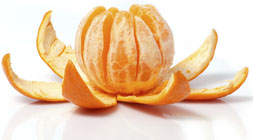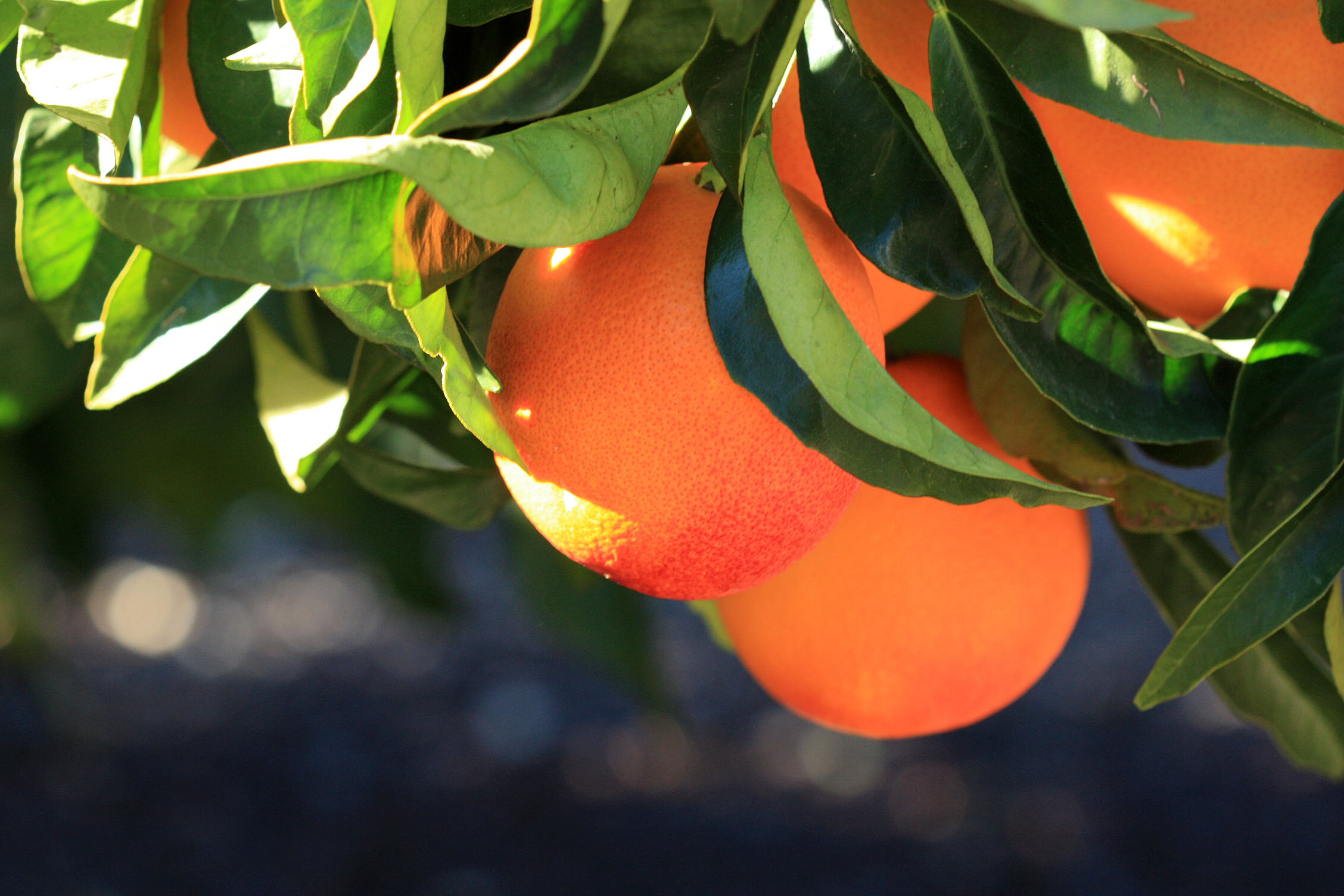By Sharon Quercioli
When I was a little girl my family would take me out of school in Ohio so that we could come down to Florida for the winter months. While we were in Florida, Mom and Dad would enroll me in the local school system. Although the switching of schools from Ohio to Florida was a bit stressful, I have fond memories of those days and remember vividly my Dad taking me to the groves to pick oranges and grapefruits. As a child, it was one of the greatest things I ever did. Dad also used to take me to the farms to pick strawberries and all kinds of vegetables. That was so much fun, too!
These days I live in Florida full time, but every January I load up on honey bell tangelos (my favorite citrus fruit) to ship home to my family in Ohio. Of course, I keep a few for myself! In fact, I eat citrus almost every day and still love to make fresh orange juice. As for the juice from the honeybells, that’s good enough to die for!
Well, let’s get to the nutritional benefits of oranges…
Nutritional Benefits
Oranges are an excellent source of vitamin C and flavonoids. One orange (130 grams) supplies nearly 100% of the recommended daily dietary intake of vitamin C. When you eat a whole orange, it provides good dietary fiber. Leave in the albedo (the white matter under the peel) as much as possible because the albedo contains the highest amount of bioflavonoids and other valuable anti-cancer agents.
Oranges are also a good source of vitamin A, the B vitamins, amino acids, beta-carotene, pectin, potassium, folic acid, calcium, iodine, phosphorus, sodium, zinc, manganese, chlorine and iron.
Health Benefits
An orange packs over 170 different phytonutrients and more than 60 flavonoids, many of which have been shown to have anti-inflammatory, anti-tumour and blood clot inhibiting properties, as well as strong anti-oxidant effects. The combination of the high amount of anti-oxidant (vitamin C) and flavonoids in oranges makes it one of the best fruits in helping to promote optimal health.
Arteriosclerosis: Regularly consuming vitamin C retards the development of hardening of the arteries.
Cancer prevention: A compound in oranges called liminoid has been found to help fight cancers of the mouth, skin, lung, breast, stomach and colon. The high vitamin C content also acts as a good anti-oxidant that protects cells from damages by free radicals.
Cholesterol: The alkaloid synephrine found under the orange peel can reduce the liver’s production of cholesterol. Whereas the anti-oxidant fights oxidative stress — the main culprit in oxidizing the LDLs in our blood.
Constipation: Even though the orange “tastes acidic,” it actually has an alkaline effect in the digestive system and helps stimulate the digestive juices, relieving constipation.
Damaged sperm repair: An orange a day is sufficient for a man to keep his sperm healthy. Vitamin C, an anti-oxidant, protects sperm from genetic damage that may potentially cause a birth defect.
Heart disease: A high intake of flavonoids and vitamin C has been known to halve the risk of heart diseases.
High blood pressure: Studies have shown that a flavonoid called hesperidin in oranges can lower high blood pressure.
Immune system: The strong content of vitamin C stimulates white cells to fight infection, naturally building a good immune system.
Kidney stones prevention: Drinking orange juice daily can significantly drop the risk of formation of calcium oxalate stones in the kidney.
Skin: The anti-oxidant in orange help protect the skin from free radical damage known to cause signs of aging.
Stomach ulcer: Consuming vitamin C rich foods helps to lower the incidence of peptic ulcers, thereby reducing the risk of stomach cancer.
Viral infection protection: The abundance of polyphenols have been shown to provide protection against viral infections.
Oranges are a real ray of sunshine on the tongue, especially in the winter, but for most of us the leftover peels are tossed out in the garbage. Bad decision! Here’s a list of alternative uses:
Compost: If you’re throwing them away anyway, consider adding them to a compost pile if you have the space and any use for fresh, healthy soil. Orange peels have all sorts of good stuff to make your soil extra fertile.
Exfoliating Scrub & Bath Oil: Ground orange peels with a dash of some other ingredients can be used as a powerful exfoliating scrub. Adding a little orange peel oil to your bath will make it extra stimulating as well as imparting healthy benefits to your skin.
Potpourri: Dried orange peels have long been used as an ingredient in potpourri mixes for an extra citric tang. If your home feels a little musky or stuffed up, boiling some potpourri in water on the stove can really lighten the air.
Orange Zest: Orange peels have been used in cooking for far longer than the fruit itself and can be used in an endless variety of dishes.
Kindling: The oil in orange peels is flammable. To see for yourself, try squeezing a fresh orange peel in front of a candle. Be careful, because a small burst of fire will be the result. Dried orange peels retain some of this oil, and they will burn longer than twigs, giving a new fire more time to spread. Smells nice, too!
Flavored Olive Oil: Adding orange peels to aging olive oil adds extra zest and is especially great on salads and pasta.
Ant Repellant: Got ants? Get orange peels, ants hate ’em! You can simply set some orange peels around problems areas. They’re also helpful on picnics and camping trips.
Bath Powder: If you don’t want to go to the trouble of rendering the essential oil of orange peels, you can simply wait for them to dry out and grind them into a fine powder. A mortar and pestle work best. The powder has a similar effect to the bath oil.
Deodorize Garbage Cans: The powerful aroma of orange peels can fight the nasty smells that accumulate in a garbage can over time. Try dropping the peels of a couple oranges in the bottom of the can before you put in the trash bag. This will also keep away bugs if you have them.
Sponge: Before the orange peel dries out, they can be used as a very effective sponge due to the degreasing properties of its oil. Give it a shot on a greasy stove top or sink.
Mosquito Repellant: Rubbing fresh orange peels over your skin will repel mosquitoes from biting when you are exposed in the outdoors.
Lowering Blood Pressure: Herbalists recommend consumption of orange peels as an effective method of lowering your blood pressure, and the Chinese have used the peels of bitter oranges as herbal medicine for thousands of years.
Aromatherapy: The oils of orange peels can be used as aroma therapy to treat the conditions of depression and anxiety.

